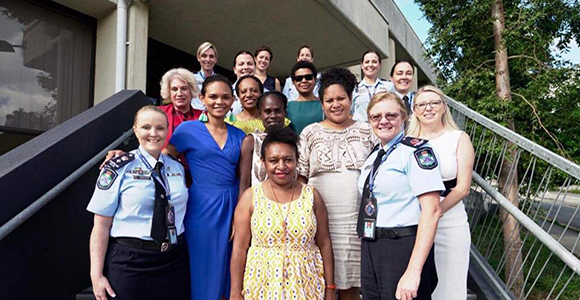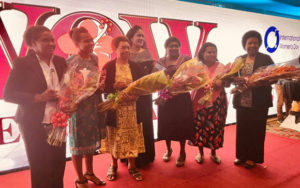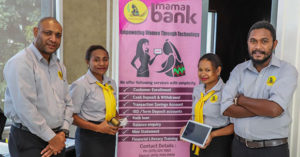Gender inequality is not just a social issue in Papua New Guinea; it is a business issue. Gabriella Munoz explores what businesses can and are doing to make a difference.

PNG Women in Leadership Fellows and Queensland Police Service Officers shared stories about their work assisting violence survivors in Australia and Papua New Guinea. Credit: Australian High Commission
It’s no secret that PNG has a gender inequality problem. The country is one of five countries worldwide that doesn’t mandate maternity leave and statistics show that over two-thirds of Papua New Guinean women will be victims of gender-based violence.
Every year, staff miss an average of 11 days of work to deal with issues arising from family and sexual violence. This costs PNG businesses between 2 and 9 per cent of their salary bills.
‘Recruitment is only one aspect of stepping towards equality.’
But strategies can be put in place to reduce these numbers and help to bridge the gender gap in the country.
Getting on board
‘Business need a clear strategy for gender as an integral part of its growth plans,’ explains Fraser Hawkins, Regional Manager—PNG & Asia Pacific at Peopleconnexion. ‘Business need to embed organisational cultures that recognise equal opportunity and ability.’
Hawkins suggests that one of the first steps towards bridging the gap is to look at remuneration objectively and ‘address any gaps that have formed [between men’s and women’s pay], put clear review procedures and benchmarks into place.’
‘In the long term, succession planning is key to bridging that gap, and ensuring there is equal access to opportunity.’
He adds that Human Resources (HR) companies can also work towards gender equality.
‘One big step is looking into training for recruiters—so they can be aware of any bias they may have in hiring and ensure they don’t hire according to that bias,’ he says.
‘Recruitment is only one aspect of stepping towards equality. It’s a complex issue that will involve looking at training, retention, health and ultimately education—it needs to be a collaborative solution.’
Working together toward change
‘Lack of women in leadership, gender violence and safety are three key issues that need to be addressed to increase participation of women in the workforce,’ explains Fraser.

Raylance Mesa, Hillary Turnamur, Petra Arifeae, Vani K Nades, Margaret Aka and Freda K Yakio were the winners of the WoW Awards 2019. Credit: Westpac
That is why leadership, training and development programs are so important in the country. These seek to educate, inspire and support women to join the workforce or open their own small or medium enterprises.
‘More and more businesses are realising the economic benefits of empowering women in the workplace.’
Take for example what’s been done through the Women’s Micro Bank program. The bank has helped thousands of women open a bank account, save and get a loan to open a micro or small business. Edna Kusuba, for example, received three loans and in 2016 opened her own cocoa fermentory in Madang. Her story is one of many.
Pacific Women Shaping Pacific Development (Pacific Women) is a 10-year Australian Government program to improve the political, social and economic opportunities of women in 14 Pacific countries, including PNG. The program started in 2012 and in PNG supports different activities to help end violence against women and promote women’s leadership and economic development.
The Business Coalition for Women is a group of PNG companies working together to drive positive change for women and businesses in PNG. Its aim is to guarantee that all workplaces are safe and free from violence towards and to do so they promote gender-smart workplace policies and practices.
These initiatives are driving change. Several women with successful stories have drawn the attention of the media and of awards that recognise women in business.
Awards such as the Westpac Outstanding Women (WOW) Awards or City Pharmacy Limited’s Pride of PNG Awards for Women, aim to recognise and empower women in the country. Sophie Mangai was recognised last year during the Pride of PNG Awards for Women. She is the President of the East Sepik Council of Women and promotes gender equality in the region. She has become a role model for other women.
Role models

In January this year, the Women’s Micro Bank launched the Mama Bank Access Point project. Credit: Daryl Mukar
Fraser explains that ‘role models contribute towards motivating and inspiring. There has been more advocacy work by government and civil societies in the last five years promoting equal and gender participation in the economy.’
Perhaps the most important achievement is that women are now being appointed to high profile positions.
Stacey O’Nea (CEO of the Port Moresby Chamber of Commerce and Industry), Lesieli Taviri, (CEO at Origin Energy PNG), Fiona J Nelson (GM Commercial at Oil Search), Kalyna Taule (Biodiversity Advisor at ExxonMobil PNG) and many more women are leading the way and paving the road for the next generation.
‘More and more businesses are realising the economic benefits of empowering women in the workplace. Such businesses are reforming their strategy to focus on equal participation of women,’ says Hawkins.
‘A shift may be starting. But it really takes everyone getting on board and acknowledging any biases.’









Speak Your Mind